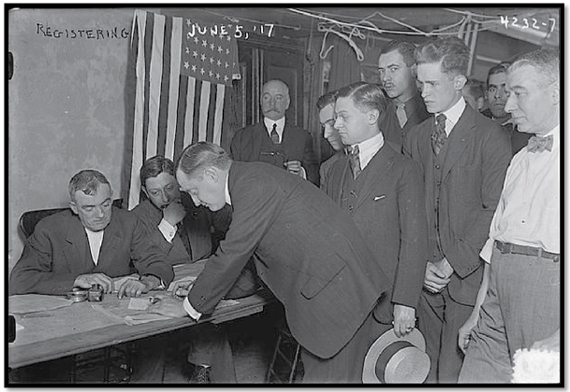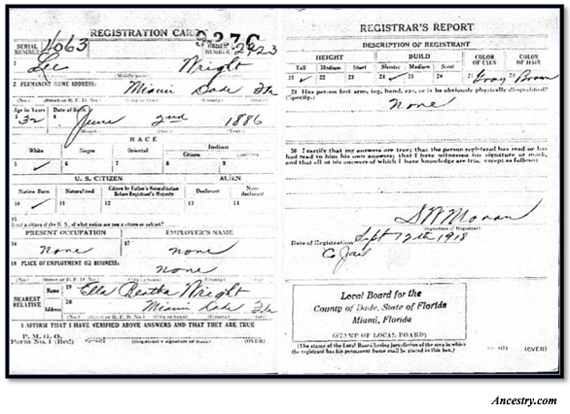I am stuck finding more information about my grandfather, Leland Wright. From a 1930 U.S. Census I know he lived in Florida and was born in Ohio about 1883. Can you help me? ~ Edmund
________________
It's a safe bet that you should always start with the United States census when you're beginning the search for an American ancestor. The federal census, which actually was first taken in our young Republic in 1790 and then every ten years after that, can give you the nuts and bolts you need to start a more extensive search: names, ages, places of residence, and the names of a person's children, relatives, and even others living in their household. But in the case of your grandfather, another repository of records contains the information you need to discover much more about his life before 1930. Leland's birth date makes him a likely candidate to have been included in one of the most significant collections of information about Americans in the early 20th century.
When Germany resumed unrestricted submarine warfare at the end of January 1917, it became increasingly clear that the United States would be joining the fight across the Atlantic. The United States had an army of less than 150,000 men at the time, nowhere near the force that would be needed to help win the Great War in Europe. To address the need for more soldiers, the government passed the Selective Service Act in 1917, which required all men between the ages of 21 to 30 to register for military service. The law was later amended in August 1918 to include all men between the ages of 18 and 45. By the end of World War I, more than half of the 4.8 million Americans who served in the armed forces had entered military service through the draft.

Just like the scope of the census, draft registration was meant to be universal--in this case, all men in the United States (under certain ages at certain times during the War) were required to register, whether they were native born, naturalized, or an alien living in this country. And for those of us searching for ancestors a century later, that registration effort left behind a genealogical goldmine: 24.2 million draft cards--all digitized and all available online! There were three registrations over the course of the war, and the third captured information about the largest range of men (ages 18-45), including your grandfather, 32-year-old Leland Wright!
Our initial research through death, marriage, and other records revealed that Leland's birthdate was actually 2 June 1886. We also found that he usually went by the name "Lee." With his actual birthdate and alternate name, we were able to find his WWI draft registration card. And that's when things got really interesting.

Looking over Lee's registration card, we took note of the details recorded on the form. He was tall, of slender build, and had gray eyes and brown hair. He lists his nearest relative as Ella Bertha Wright, his new wife of less than three months. (This was Lee's second marriage. His marriage to your grandmother in 1927 was his third.) But the most intriguing fact appears under the Date of Registration on the right-hand side. Under the date "Sept 12 1918" is written "Co Jail." Could Lee have been in jail when he registered for the draft? We turned to local newspapers to see if we could find anything that Lee might have done to warrant incarceration.
Long before Twitter, Facebook, Instagram, and all of the other sorts of instant status updates that come with modern technology, and the seemingly nonstop stream of celebrity gossip on internet websites, television or radio, newspapers were the way a person stayed in the know. And newspapers contain much more than the stories that made front page headlines--especially local newspapers, which, in their way, are also treasure troves of information about our ancestry. Visits from an out-of-town relative, divorce decrees, neighborhood parties and local social events, political rallies, and--yes--arrest announcements are just a few of the interesting stories that found their way into our local daily and weekly hometown newspapers.
A search of the local newspapers in the region where Lee Wright lived turned up a fantastic article dated 4 September 1918, only eight days prior to Lee's WWI draft registration. According to the article, Lee had originally been arrested for trying to sell alcohol. While Lee was in jail for this alleged crime, the chief of police ordered the deputy sheriff to raid Lee's home. During the raid, the authorities discovered a "still and a quantity of moonshine." But wasn't this two years before Prohibition began nationally in 1920, you may ask?
For many of us, the word "Prohibition" brings to mind romanticized images of the Roaring Twenties or the gangster era of Al Capone, Bugsy Siegel, and Dutch Schultz. Those images have been shaped by Hollywood's numerous interpretations of the era, from the comic brilliance of the trio of Lemmon, Curtis, and Monroe in Some Like it Hot (1959) to the gritty violence of The Untouchables (1987) with Robert DeNiro as the infamous Al Capone, and more recently, of course, with HBO's Boardwalk Empire.

The reality is that alcohol prohibition was a hotly debated issue that traced its root back to the temperance movement of the 19 century. Proponents made a case for public morals and health, while opponents believed it violated rights and freedom of choice. While the 18 Amendment mandating national prohibition didn't go into effect until January 1920, many states adopted "temperance laws" long before. Florida, where your grandfather lived, was one of those early temperate states. Statewide prohibition didn't begin until 1919, but before that, individual counties could decide whether they were "dry" or "wet." Leland, apparently, and much to his great misfortune, lived in a dry one.
Not only does the newspaper article tell us why Lee was in the county jail when he filled out his draft card, it gives us a quote from Lee himself. He is said to have told authorities, "I knew the police didn't have anything on me [in reference to his original arrest], but that discovery of the still is another thing altogether."
Lee was unable to make bail, which is why he filled out the required WWI draft card sitting in the county jail.
We don't know what ultimately happened when Lee got his day in court, but some research into county criminal records might shed more light onto his case. We do know that Lee carried on with his life and nine years later, in 1927, divorced Ella and married your grandmother, Leath Fisher. We are sure they toasted their marriage, one way or another!
Prohibition remained in place until 1933, so Lee lived to see that. But he lasted only two years longer: he died of pneumonia at the age of 49 in 1935. When Lee passed away, his youngest child (your father) was only about nine months old, so he may not have heard the more colorful stories about his father's colorful history. But with the help of military records and newspaper articles, we have been able to help you, his grandchild, catch a rare glimpse into your grandfather's life during one of the most notorious and interesting times in American history.
Do you have a mystery in your own family tree? Or have you wondered what family history discoveries you could make with a DNA test? Send Henry Louis Gates, Jr. and his team of Ancestry experts your question at ask@ancestry.com.